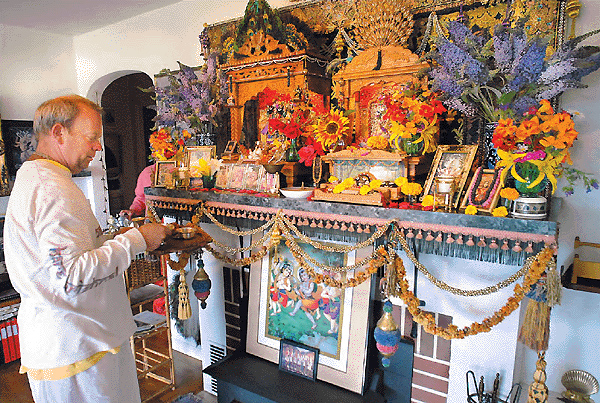
|
|
|
|
Krishna Consciousness in Rural Washington Aug 16, SEDRO-WOOLLEY, WASHINGTON (SKAGIT VALLEY HERALD) — Like a lot of people in the early 1970's, Damaghosa dasa tried to avoid Krishna devotees by crossing a street in Seattle. But Dasa didn't duck them completely, and something about their encounter clicked, pointing him in what he says was the right direction for his spiritual journey. Dasa, who was 28 at the time, became a Krishna devotee. Taking the spiritual name Damaghosa Dasa, he traveled around the country with other devotees to bring Krishna teachings to others. More than 30 years later, Dasa, now 59, and his wife, Daria Wheatley, 54, live east of Sedro-Wooley [Washington] and base their lives on their Krishna beliefs. They and other devotees gather each Sunday in the couple's brick house, or at the homes of other Krishnas in Snohomish County to share the beliefs and practices with others. Like Hindus, the Krishnas also believe in reincarnation and that all living beings, such as insects and animals, have a soul. They also believe Krishna, also called Rama, is God and created three aspects of himself: Brahma the creator, Vishnu the maintainer and Shiva the destroyer. Krishna followers follow the faith's four principles, called the pillars of religion - compassion, truthfulness, cleanliness and austerity. Devotees chant, dance and feast as a way to connect with divinity. "(Chanting) is meant to revive people's dormant God consciousness," Dasa said. They chant the names of God, which in the Krishna faith are: Hare Krishna, Hare Krishna, Krishna, Krishna, Hare, Hare, Hare Rama, Hare Rama, Rama, Rama, Hare, Hare. Devotees chant the mantra 16 times each day.
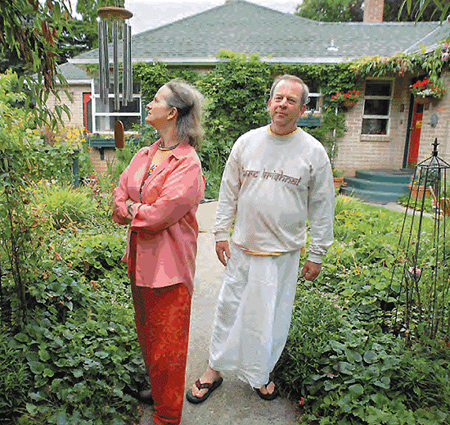
Dasa said he and other followers see no reason why people can't chant the name of Christ or Allah. He said Krishna isn't a sectarian belief but a way to connect with the divine. "Religion, itself, is ecstatic experience between the soul and the supreme soul," Dasa said. Discovering devotion That meeting in Seattle in the '70's was the second time Dasa had encountered devotees of the International Society for Krishna Consciousness. He first met them several years earlier in Detroit. He was working as a photographer at his college newspaper and was assigned to cover a Krishna event. He was raised Catholic and had attended parochial school. Now a young college student, he was on a quest, had stopped eating meat, and explored transcendental meditation and other paths, seeking a stronger connection to divinity. "It was the days of the hippies," he said. He was among many Americans who were attracted to Krishna in the first decade after the teachings were bought to the United States, when Bhaktivedanta Swami Prabhupada arrived in 1965. A year later, Prabhupada founded the International Society for Krishna Consciousness. Krishna beliefs are based on the 5,000-year-old Bhagavad-gita, a Sanskrit text also known as the Song of God. The society's founder's English translation is bound in 30 volumes.
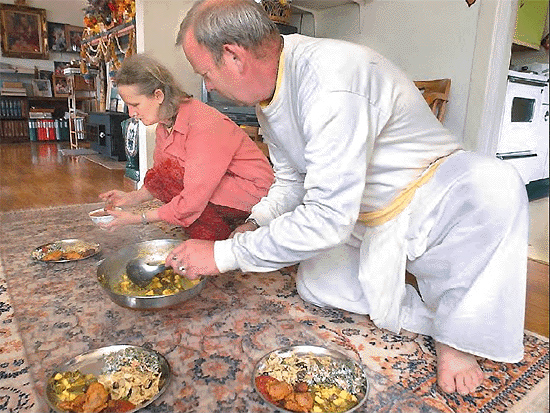
Krishna followers chant because Lord Chaitanya Mahaprabhu, who is believed to be a 16th century incarnation of God [sic], taught that it is the most effective method of "achieving self-realization and love of God," according to society literature. After his second encounter with Krishna devotees, Dasa was ready to hear what they had to say. "'It's like sugar; wherever you bite into it, it's sweet,'" he said, quoting from the society founder. After traveling the United States, he returned to the Green Lake area of Seattle and eventually met Wheatley. Wheatley said she realized that Krishna was the most important thing in Dasa's life the moment she met him. Although, in a sense, she is still Christian, she too felt the call. "He said last Sunday (July 17), 'It's not a question of you turning your life upside down. You just add to your life," she said. Krishna in the U.S. As Dasa grew into the faith, Krishna in America also evolved and changed. At the time Dasa became a devotee, followers were taught to live in temples and travel, leaving their children to be raised in Krishna schools - a practice that was discontinued more than 20 years ago. While Krishna grew and flourished during the 1960s and 1970s, the numbers of followers declined in the 1980s. Then scandal rocked the movement in the 1990s when children from Krishna boarding schools filed lawsuits alleging abuse, similar to that alleged against the Catholic Church. The society launched its own internal investigation, established a department to investigate welfare complaints and published accounts of victims in the organization's journal. It also policed itself, disavowing temples that broke with traditions. Although some devotees live in monasteries most modern American Krishnas, including those who preside over religious ceremonies, hold jobs and live with their families in their own homes. Dasa is a contractor and Weatley is a hat designer. Recently the society started a fully accredited theological college in Belgium, which is connected to the University of Wales, said society spokesman Anuttama Dasa. In additional to spiritual training, students also learn leadership, management and other skills associated with clergy administration. Nowadays the society is an association of 400 temples, 100 vegetarian restaurants and various community projects. There are more than 1 million followers worldwide; 100,000 followers live in the United States. To practice four Krishna principles - compassion, truthfulness, cleanliness and austerity - followers abstain from gambling, illicit sex, eating meat (including eggs and fish), and intoxicants (including coffee and tea). "The things that make us spiritually healthy and make us materially healthy," Anuttama Dasa said. "Where ever there is life, there is a soul, there is consciousness, and we should minimize the violence against all sentient creatures." Celebrating faith With the closest Krishna temples in Issaquah and Vancouver, B.C., Dasa's gatherings attract people from Bellingham and Tacoma. Dasa and other followers hold gatherings at other followers' homes in Snohomish County. Some people prefer smaller gatherings at members' houses or at a temple. Others prefer the larger services, he said. Gatherings can be a simple affair with chanting, dancing, feasting and discussions about faith. Or they can be beautiful ceremonies with paper mache decorations symbolizing various incarnations of Krishna. Vikas Gupta, 35, of Marysville is one of several Krishna followers who attend regularly. In a sense, Gupta came thousands of miles to Krishna. He'd been exposed to Krishna while growing up in India, but rediscovered it after he moved to the Northwest eight years ago and found achieving the American Dream didn't fulfill the yearnings of his soul. "When I came to the United States, I had big, big dreams, uncontrollable desires," Gupta said. "It was all about money, money, money. I worked toward it." He helped his parents purchase a big, beautiful home in India and provided a home for his family here. He said he changed professions several times, finding financial success in most of his ventures. But something was missing. At one point, Gupta owned and operated several 7-Eleven stores. As he encountered hundreds of customers a day, he began to wonder: What am I doing here? The question wasn't about his physical location or his job, but about the state of his spirit, he said. "I started to look at my life seriously and wondered where I was going," said Gupta, who works as a software engineer. He turned to Krishna, which teaches it devotees that that they return to earth after death because they desire something. Now Gupta wakes up between 4 and 5 a.m. and chants. "Those two hours will be the best time in my day," he said. Gupta has reached a point in his religious practice where he has decided to undergo a hari nama initiation on Aug. 17. Gupta said he sought a public initiation because it intensifies his pledge. "It's going to be happening in front of fire, and I'm going to commit in front of fire, a very severe promise, not a promise I made to (just) myself," Gupta said.
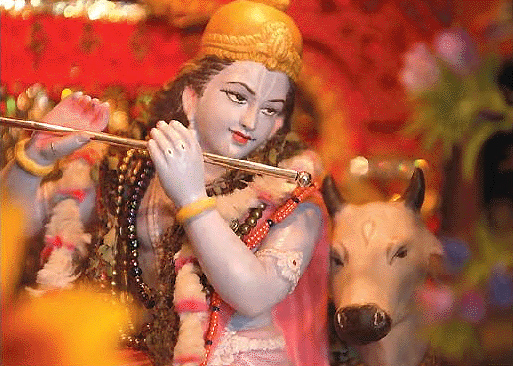
Living principles Dasa and Wheatley moved to Skagit County about 10 years ago and settled in their home on 2 acres of land on Harrison Road. Dasa and Wheatley mostly eat food they grow in a 2,000-square-foot vegetable garden and from their fruit and nut trees. They purchase just a few staples, such as organic butter and milk or pasta grown from organic wheat. They hope to have a cow or two. Wheatley showed off her garden in late July, touting the antioxidant properties of various plants, fruits, nuts and berries. Violets grow next to rosemary and rustic arugula. She and Dasa grow three varieties of apples, potatoes and corn, several rows away from bunches of basil, which she chops and freezes. She shared tips for growing a bumper crop of cherry tomatoes - raised beds on asphalt, milk powder, Epsom salt and mulch to keep the heat in. The cherry tomatoes take less labor to dehydrate, Dasa explained. She and Dasa smiled over their squash crop. Last fall, they had 150, and Wheatley was still cooking with that harvest. This year looks to be another bumper crop. Cooking and eating vegetarian cuisine is an important part of the Krishna movement. "It's a kitchen religion, as they say," she said. Meals are shared first with Krishna by placing a little o the altar as an offering to Krishna, then eaten. "You eat your way back to the spiritual world," Dasa said.
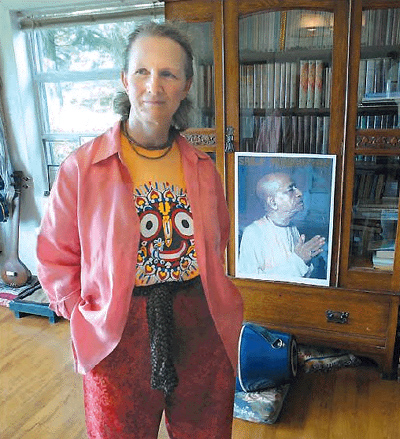
As they walk past a no-kill metal trap, Dasa explains his mouse and rabbit relocation program. After catching, the rodents are released near the Cascade trail down the road. This satisfies Krishna beliefs and keeps garden pests down. "They get some, and we get some - live and let live," Dasa said.
What: Janmastami, the birthday of Lord Krishna, the most holy day for devotees of the International Society of Krishna Consciousness. When: Aug. 16 noon Aug 17, times to be announced. Where: 8805 Harrison Road, Sedro-Woolley. Features: Chanting, dancing and feasting on 108 dishes. In India, Janmastami is a major holiday as well, celebrated by Hindus of all denominations. Cost: Free Contact: For times and to RSVP, call Damaghosa Dasa at 856-5411 or email DasDasDas@aol.com.
| |
| The Sun | News | Editorials | Features | Sun Blogs | Classifieds | Events | Recipes | PodCasts | | About | Submit an Article | Contact Us | Advertise | HareKrsna.com |
